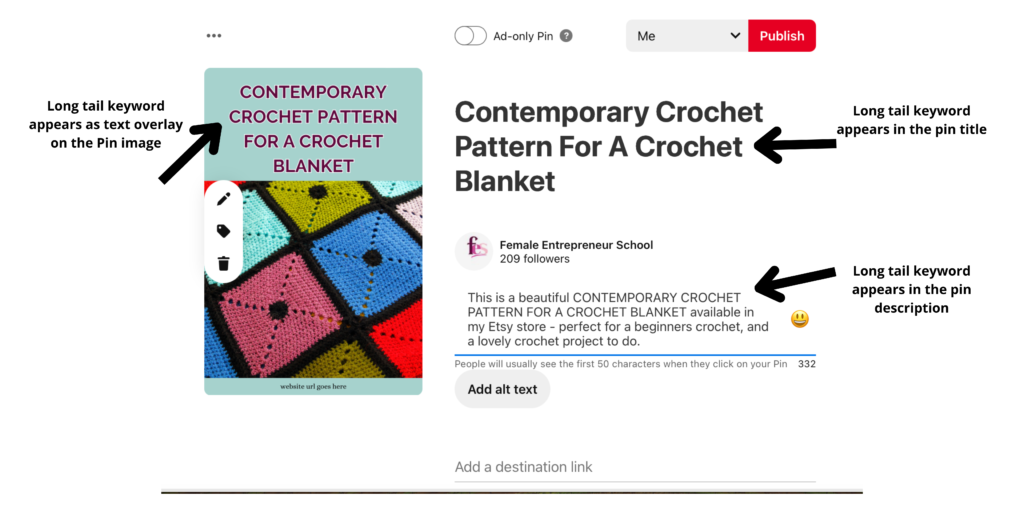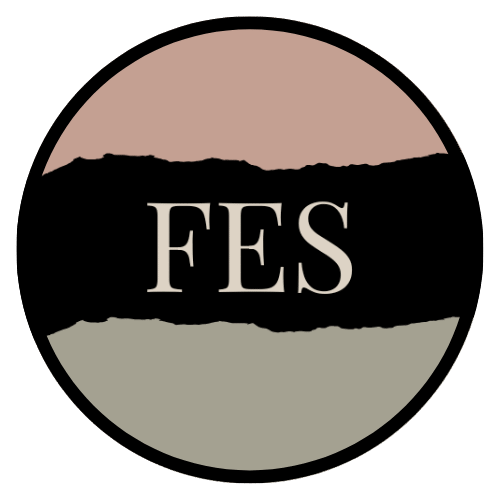How To Search For The Perfect Keywords On Pinterest

Bonus Material: 50 Best Pinterest Tips Guide
Introduction
Pinterest can be a brilliant platform for female small business owners looking to drive organic traffic to the inner sanctions of their businesses.
But if you’re going to use Pinterest as part of your marketing strategy, it’s important to understand how the platform works, and to set your account up in a way that is Pinterest friendly, and in line with good Pinterest protocol.
Part of that strategy includes understanding that Pinterest is a visual search engine that is a keyword optimised platform.
Because of this it is essential to make sure your whole Pinterest account is optimised using the right keywords both for your business, and for the right audience who are active in the platform and a good fit for your brand.
If you use Pinterest without understanding or using relevant keywords for your niche, the chances of achieving any level of success on the platform are slim.
I learnt this to my cost when I first started my Pinterest journey many years ago, when I did not understand how core to good Pinterest strategy relevant keywords are.
Pinterest is not a social media platform. It is a search engine like Google, only much more visual. You need to understand good Pinterest SEO to make best use of the platform, and keywords are relevant to that SEO.

Your audience is on Pinterest. I can pretty much guarantee that. But rather than scrolling looking to be entertained in the way most people are on social media, your audience is inside Pinterest using search terms to find answers, inspiration and products and services to purchase.
The search terms your audience uses on Pinterest are what we call keywords.
Your goal on Pinterest is to find the best keywords that are relevant to your niche, and use those pinterest keywords as part of your Pinterest strategy.
Using appropriate keywords in board titles, on board descriptions, in pin titles, pin descriptions, text overlay on pins, and in your Pinterest bio will be key to your success on Pinterest.
This is the core of good Pinterest strategy.
In this blog post I’ll show you how to use the Pinterest keyword research tool to find and use keywords for your Pinterest strategy.
There’s more to Pinterest strategy than keywords, but without keywords in place for your Pinterest account, everything else that follows is likely to fail.

Let’s Look At How To Search For The Perfect Keywords On Pinterest
1. Understanding Pinterest Keywords
Pinterest keywords are crucial to your success on the platform.
Using keywords throughout your Pinterest account helps to educate Pinterest what your account, your boards and your pins are about.
This means Pinterest can then index your pins effectively – meaning as part of their search engine optimization they can show your pins to the right people searching for the right keywords, that are relevant to the keywords you use on your account.
Without a keyword optimized account, Pinterest will find it much more difficult to put your pins in front of the right people searching for the keywords that are relevant to the pins you post.
The more keyword friendly your Pinterest account is, the greater the chance your content will be found.
2. Brainstorming Keyword Ideas
It’s important to understand your target audience, and what it is they’re searching for on Pinterest.
Doing this enables you to create content, products, services that match the needs of your target audience.
You can then create boards and pins on your Pinterest account that match the keyword searches your target audience is typing in to Pinterests search engine, and you can make sure that the keyword pins you post go to content, products and services that are relevant to those keywords.
For example, let’s take a small business owner who is in the crochet niche.
That small business owner needs to understand what crochet terms people are searching for on Pinterest.
As she goes through her research inside Pinterest, she finds that one of the keywords people are searching for is ‘vintage crochet patterns‘.
Unfortunately her crochet patterns are more contemporary, so the search term ‘vintage crochet patterns‘ would not be suitable for her to use, unless she started to introduce some vintage crochet patterns she could pin about.
However, she goes back to Pinterest to research more Pinterest keywords, and bingo! – she finds that the search term ‘contemporary crochet patterns‘ is a long-tail keyword people are searching for inside Pinterest.
She can now create a board on her Pinterest account and name it ‘contemporary crochet patterns‘.
She can then pin any number of pins to that board (over time), that are pins that lead to her contemporary crochet patterns on Etsy.
Her pin designs, her pin titles, her pin descriptions will all contain the long tail keywords ‘contemporary crochet pattern‘ to educate Pinterest that the pin relates to the board, the pin titles and descritpions relate to the pin images, and the pins, pin titles, pin descritpions relate to the location (url) that the pin goes to. Here’s a visual of how that might look on Pinterest:

Many small business owners create products, services and content without first understanding what it is their target audience is looking for.
It is essential that you research what your audience is searching for on Pinterest before you start to use the platform, so that you can align your Pinterest strategy, and your content, your products and services to match the searches Pinterest users are typing into the Pinterest search bar.
There’s simply no point you putting pins out that are, for example, ‘crochet socks for frogs‘ if no-one is looking for that search term inside Pinterest.
You need to spend some time inside Pinterest researching and brainstorming keyword ideas related to your niche or industry, and more specifically to the search terms Pinterest users are using.
3. Understanding Pinterest’s Search Bar
You can use Pinterest’s search bar to start to research keywords for your niche.
More importantly, when you do this, you are looking to find LONG-TAIL keywords relevant to your niche.
Let’s go back to the crochet business owner.
If she goes to Pinterest’s search bar (which is the search bar at the top of Pinterest’s platform on a laptop, or the magnifying glass at the bottom of the screen on a smartphone or tablet), and she types in the word ‘crochet‘, this is what Pinterest will show her:

You can see that the first keyword shown is ‘crochet‘, second to that is the keyword ‘crochet patterns‘.
You have to be mindful about using keywords that are shorter keywords.
The competition for the keyword ‘crochet‘ would be huge on Pinterest – making it harder for your content to be found if you only use the word ‘crochet‘ on your board and pins.
In addition, you’re trying to target more niche search terms (the long-tail keywords), your audience is looking for, so that you can really connect your content, products, services, pins to those more niche terms.
So if our crochet business owner drills down a little more with her keyword research, and she types into the Pinterest search bar ‘crochet patterns for blankets’, she will see these long-tail keywords results:

Now she has the ability to create a board called ‘crochet patterns for blankets easy‘ or ‘crochet patterns for blankets in square‘, and then post pins to that board that relate to any of her patterns that are crochet patterns for blankets.
These long-tail keywords will have less competition than, for example, the shorter keyword ‘crochet‘, and it means pins on her board will find her audience searching for ‘crochet blanket patterns‘ more easily.
Remember, the whole point of keyword optimisation on Pinterest is to find keywords your target audience is searching for, and use those keywords to help educate Pinterest what your boards and pins are about.
All of your Pinterest boards should be keyword optimised.
So in the example of our crochet business owner, she can call one of her boards ‘crochet patterns for blankets in square‘, she can add a board description that says something along the lines of ‘find all of my crochet patterns for blankets in square on this board, including crochet blankets in square for beginners, easy crochet blankets in square, baby crochet blankets in square and advanced crochet blankets in square’.
She would then make sure that every pin on that board relates to crochet blankets in square. Doing this shows Pinterest that there’s a connection between the board, board description and all the pins on that board. This keeps Pinterest’s algorithm happy.

When you’re searching for long-tail keywords on Pinterest, you’re searching for those you can use in your Pinterest profile description, as titles on your Pinterest boards, on your board descriptions, on your pins, your pin titles and pin descriptions. They should then all align with the urls you’re driving your pin traffic to.
For example, you would not want to put a pin on Pinterest with the text overlay that says “crochet pattern for blanket in square’, and then link that pin to a url that goes to a crochet Christmas wreath. This is spammy and Pinterest will not like it. I see this type of spammy behaviour happening on Pinterest more often than you think.
In addition, when you start to search for long-tail keywords in Pinterest, you can gather a huge amount of information about content you can create around those keywords.
As I learn more and more keywords relevant to my audience on Pinterest, I add those keywords to a Google spreadsheet, so that I can use those keywords as inspiration to create blog posts, podcasts, digital products and trainings around the topics my audience is on Pinterest searching for.
When you find the right pinterest keywords for specific topics relating to your target audience and your niche, and you use those keywords for board names, on your Pinterest images, pin titles and descriptions, you’re using Pinterest strategy that helps your pins rank on Pinterest.
This means your pins have a much greater chance of showing up in Pinterest search results, helping your audience find your content on the platform, and increasing the chances that they will click through your pins to the deeper places in your small business.
The Pinterest algorithm is a powerful SEO tool, and the more you can relate your Pinterest account to good long-tail keywords inside the platform, the more growth and success you are likely to see on Pinterest.
When I optimised my entire Pinterest account (you can see my account here if you want to check it out), using great long-tail keywords, and I started posting consistently on Pinterest, my growth went from this:

To this:

In just eight weeks. That’s the power of Pinterest when you use great strategy on the platform.
The best place to learn how to easily use Pinterest for your small business is inside my Pinterest 101 training. Always kept up to date, and with everything you need to know about Pinterest, it’s your complete guide to using the platform effectively for your small business. You can find details of that training here.
Conclusion
- Make sure you invest time researching long-tail keywords inside Pinterest.
- Keep a spreadsheet of all long-tail keywords relevant to your niche.
- Make sure you Pinterest bio, board names, board descriptions, pin visuals, pin titles, pin descriptions contain relevant long-tail keywords.
- Do not keyword dump anywhere on your Pinterest account. This can be seen as spammy by Pinterest and may impact your account.
- Think about the products, services and content you can create that aligns with the long-tail keywords your target audience is searching for on Pinterest.
- Stay on top of current Pinterest strategy to maximise your chances of success on the platform.
- Be consistent with your pinning schedule. Big gaps will lead to a downturn in your Pinterest metrics.
If you’ve found this blog useful, drop a comment, I’d love to hear from you. Or, if you have any Pinterest related questions, drop a comment. I’ll be sure to respond.
BONUS MATERIAL: 50 BEST PINTEREST TIPS GUIDE
RELATED POSTS
HOW MANY PINTEREST BOARDS SHOULD YOU HAVE?
